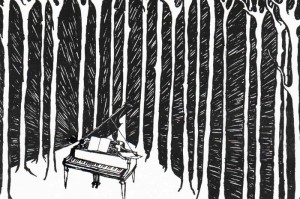
Philip Glenister as Walter Harrison and Charles Edwards as Jack Weatherill. Photo Johan Persson
I like a production that announces itself with a bang. And This House is such a production. The energy of the first entrance, in addition to the set, both intimate and imposing – the Cottesloe never looked this huge, make a clear statement and from the first few minutes I knew this production will be something special. The next three hours didn’t disappoint.
This House is set in the House of Commons between 1974 and 1979, when Labour, with a tiny majority (or often with no majority at all) was trying to hold onto power. The period has inescapable drama and Margaret Thatcher looms large: not in the choices of the characters but in the mind of the audience, we know the consequence of those choices even if they don’t. The action is largely set in the offices of Tory and Labour whips, with excursions to almost all parts of the building (toilets, corridors, basements, chapel) but we see very little of the House of Commons’ main chamber. This story is set at the bowels of power. The Cottesloe is made to look like the debating chamber but that only reinforces the point: the backstage drama is central to politics, only punctuated by the political debate.
James Graham (who wrote The Man, one of my favourite plays of the last few years) makes a marvellous job of the story: his script is astute, funny but, most of all, interested in the human condition: these people plod along, get confused, are not always clear about what they can achieve. Characters with very few lines are still fleshed out to a poignant presence. This is a world before media spin and expenses scandal. It’s a world where politics – both the debate and backstage action – can relate to real life. The writing has flair and substance, and the result is fast, funny, involving and unexpectedly moving. Continue reading →



